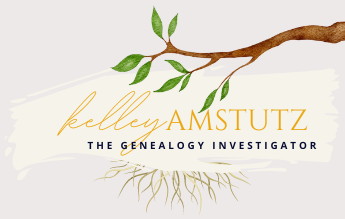I want you all to stop and think for just a minute. Think about all the friends, coworkers, and neighbors you see each and every day. How many of those people will show up on your family tree one day? It's a good question, right. Something we don't often think about. And probably a few of those surnames might pop up in your tree. But, it's important to remember that you're part of a bigger community, one that shapes who you are and the decisions you make, just as much as your blood relatives.
Read MoreNEW BLOG SPACE
I’m writing a little different these days! CHECK me out on Substack - where WE can connect on a more personal level!
Use the QR Code (to the right) — OR the link:
https://thegenealogyinvestigator.substack.com/
Can’t wait to see you there!
Land records are one of the most underutilized resources in genealogy, believe it or not. What once brought immigrants to America, the ability to obtain land, is often completely forgotten in research. Established countries, like Europe, almost all land had been titled for years, even centuries. Laws of primogeniture (inheritance by only the FIRST SON) ensured that properties wouldn't be split up into smaller parcels, but that also meant that other children couldn't inherit the land.
Read MoreThe Civil War produced huge amounts of documentation with over 3.5 million men (and a few hundred women) fighting for both the Union and Confederacy. But... because military records do not fit familiar patterns of most genealogical research you will conduct, vital records, passenger lists, and so on... these records can be overwhelming to a first-time researcher. But, by understanding a few key facts and having some great resources in your toolbox, you can start with a wealth of information about your Civil War ancestor before you even start digging!
Read MoreUS Federal Census reports are an important part of a Genealogist research. Census were taken every 10 years, providing the opportunity for genealogists to follow families back in time. They would provide locations of ancestors, age information, occupations and geographical data. They also hold clues about an ancestor's educational background, and even military status. So, with Census documents holding so much valuable information... it's so frustrating when you run a name search for an ancestor and you end up with NO RESULTS!
Read MoreAs you're tracing your family history, you'll at least occasionally find that you need the help of a professional genealogist to make the progress you want. This can be due to time constraints in your own life, a need for verification of your work, dealing with a foreign language, or searching for an ancestor who left little written history behind. Whatever the reason my be, when it's time to hire a professional genealogist, it's important that you find one who is trustworthy and whose work will last for generations to come.
Read MoreSometimes the KEY to solving a genealogy mystery is going BACK to the BASICS!
When you run up against a genealogy BRICK WALL - try these nine (9) old-school ways to break that wall DOWN. You'll find that not only can old dogs learn new tricks... but dogs both young and old will benefit from practicing these time-tested strategies!
Read MoreAs a Genealogist... you've probably already discovered that the term "Brick Wall" is discussed almost regularly! We love to chat about the brick walls that are blocking our search into families' pasts. Usually, these brick walls are only detours that we can find our way around by stepping back and taking a fresh look at our research.... seeking out different record types... or doing some cluster research to find a clue buried in the overload of information.
Read MoreWe all love and live for the thrill of the HUNT... the challenge of a mysterious kinship or hidden story. We hone our research skills, learn about records and think over the evidence we uncover. But, there's another part of the detective work that we often overlook... writing reports about our research.
Read MoreWhen you start looking into family research, nine times out of ten the trail will lead you to start questioning how immigrant ancestors got to America.
Read MoreSitting down to start your genealogy research... it is common practice for many professional genealogists to begin by looking at DEATH RECORDS, first. Death certificates and records give us the most recent evidence of our ancestor's lives.
Read MoreWhen working with genealogy in the United States, every family tree you encounter will have an immigrant ancestor. The only question is when that migration took place.
Read MoreAs recently as the 20th century in the United States and elsewhere, the death of a father meant that his children were orphans, no matter if the mother survived him or not.
Read More











